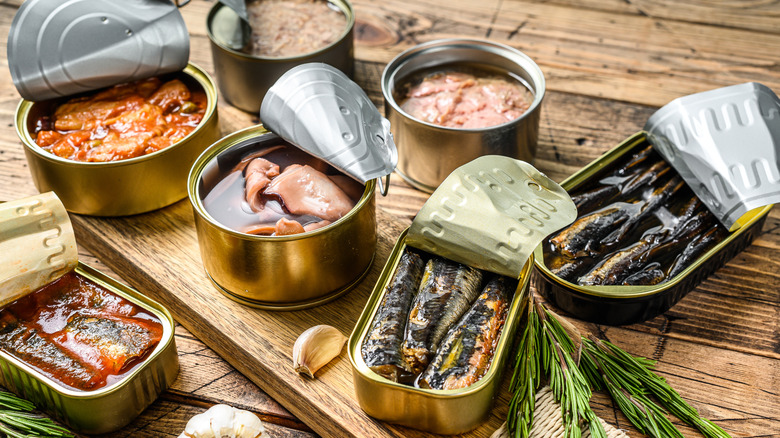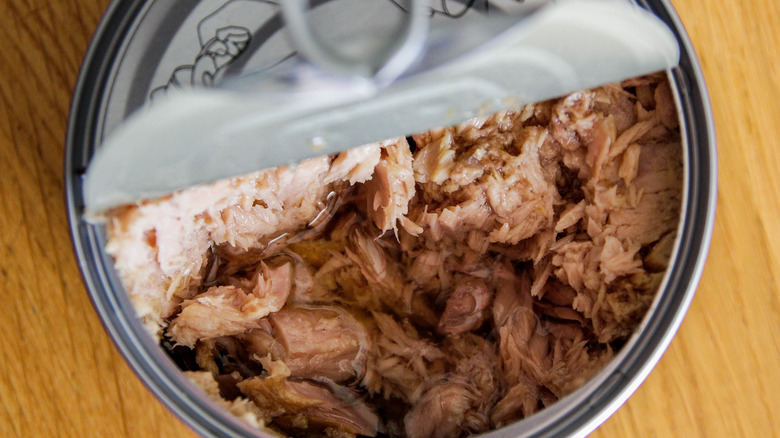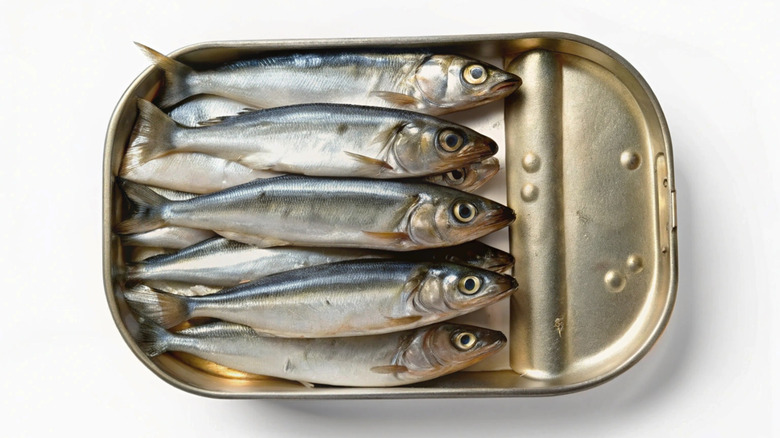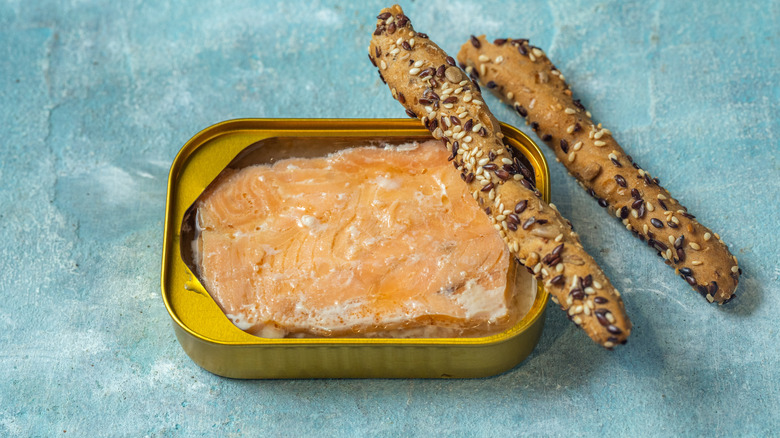5 Of The Healthiest Canned Fish You Can Buy At The Store
Canned food often gets a bad rap, but where canned fish is concerned, that reputation isn't entirely fair. While fresh fish is often seen as the gold standard, its canned counterparts offer many of the same benefits — and at a fraction of the cost. Nutritionally, quality canned fish retains much of the protein, omega-3 fatty acids, and essential vitamins found in fresh varieties. Some options like canned salmon and sardines even have added nutritional perks because the canning process softens the bones, making these fish an excellent source of calcium. While there might be slight differences in texture or taste, the gap isn't nearly as wide as you might think. Canned fish can be particularly delicious in recipes like croquettes, salads, and pasta dishes.
Of course, not all tinned fish is created equal. Some varieties of canned fish are far from healthy. When buying canned fish, it's important to look out for cans with excessive sodium. Certain types of fish are also known to be higher in mercury (though this is not exclusive to tinned fish) or are packed in oils that make the fish more caloric. However, there are also plenty of excellent choices that are nutrient-dense and tasty. Whether you're looking for protein-filled snacks, economical meal options, or are simply a fan of seafood, there are plenty of great canned fish products worth stocking in your pantry.
Skipjack tuna
Skipjack tuna is one of the healthiest canned fish options you can buy, offering an excellent balance of nutrition, affordability, and sustainability. According to guidelines set by the Environmental Protection Agency (EPA), skipjack is classified as a "Best Choice" fish in regard to mercury levels, meaning it's safe to consume up to three times per week without concern. In comparison, other tunas like albacore and yellowfin are labeled as "Good Choice" fish and are considered safe to eat about once a week without exceeding maximum recommended mercury consumption. Meanwhile, bigeye tuna accumulates significantly higher levels of mercury due to its extended lifespan and size, and as a result, the EPA labels it as "Avoid."
Skipjack tuna is also an excellent source of lean protein, providing around 24 grams of protein per 85-gram (3-ounce) serving, making it a satiating and muscle-supporting choice. Nutritionally, skipjack is packed with essential vitamins and minerals, including vitamins B3 and B12, which are important for red blood cell count, energy levels, and immune system regulation. It also provides vitamin A, which helps maintain healthy vision and skin. When choosing canned skipjack tuna, it's healthiest to opt for varieties packed in water or olive oil. This is because vegetable oil or brine-filled cans may contain excessive sodium and offer less nutrition. Water-packed tuna keeps the calorie count low, maintaining a mild, clean taste, while olive oil enhances the flavor with healthy fats.
Sardines
Sardines are one of the healthiest canned fish options on the market thanks to their impressive nutrient profile and extremely low mercury levels. Since sardines are so small, they feed on plankton rather than other fish. This results in significantly lower mercury accumulation per serving, especially when compared with larger species like swordfish. This makes them one of the safest seafood choices for regular consumption.
Sardines are also an exceptional source of vitamin B12, a crucial nutrient for fertility, red blood cell formation, cognitive support, and managing stress levels. A single 100-gram serving of sardines in oil can provide nearly quadruple the recommended daily intake, so incorporating this little fish into your diet can have a big impact. Beyond their noteworthy vitamin content, sardines are also rich in heart-healthy omega-3 fatty acids, which have been shown to be beneficial in everything from managing rheumatoid arthritis to preventing cancer.
Canned sardines also offer the unique advantage of being edible without requiring you to remove their bones, as these become soft during canning. This provides a notable calcium boost (about ⅓ of your daily recommendation in a 100-gram serving) that aids with strong bones and teeth. While fresh sardines still require a time-consuming gutting and deboning process, canned sardines come pre-cooked and preserved in oil, water, or sauces, so you can enjoy them straight from the can or rinsed in a variety of meals.
Wild salmon
Tinned wild salmon offers a clean, nutrient-dense alternative to farmed salmon, with significantly fewer contaminants like dioxins. Because wild salmon live in their natural environment and feed on a diverse diet, they contain far lower levels of harmful toxins that can accumulate in farmed fish due to their processed feed. (Although, to be fair, farmed salmon feed has been improving in recent years.) Wild salmon is also naturally high in omega-3 and omega-6 fatty acids, which play a key role in brain health, heart function, and reducing inflammation. Each 85-gram (3-ounce) serving of salmon boasts a substantial 1,800 milligrams of omega-3 content. Meanwhile, seafood like shrimp and tilapia contain less than 300 milligrams of omega-3 for the same portion.
While fresh wild salmon is highly sought after, canned wild salmon offers many of the same health benefits at a much lower price, with the added convenience of a longer shelf life. Not to mention that the EPA labels salmon as a "Best Choice" seafood, with lower mercury levels than most other types. Tinned salmon even has slightly lower mercury content than fresh or frozen salmon, with just 0.01 ppm mercury concentration on average, compared to 0.02 ppm. Another major benefit of wild salmon is its rich concentration of astaxanthin, a powerful antioxidant responsible for the fish's orange and light pink color. Astaxanthin additionally helps protect cells from stress, which has been shown to improve immune function.
Wild-caught North Atlantic cod
Canned wild-caught North Atlantic cod is particularly rich in selenium, an antioxidant that plays a key role in immunity, reproduction, and thyroid health. In contrast to fattier saltwater fish like herring and anchovies, cod is a lean protein source that's naturally low in fat while still providing high amounts of essential amino acids and vitamins. This makes it a smart choice for those looking for a protein boost without the extra calories from fat. Although cod in general is a healthy choice, wild-caught North Atlantic cod offers higher protein, omega-3, and vitamin B12 content when compared to Pacific cod. Cod liver, found in both classic cans of cod and liver-specific varieties, is considered to be particularly beneficial for those living with anxiety, depression, or joint pain.
As stated, cod is a great source of several B vitamins, including B6 and B12, which assist with metabolic functions. The high B12 content in cod further supports red blood cell production and nervous system health, making it a well-rounded choice for those looking to boost energy levels and cognitive function. Although cod is a larger fish, it contains lower mercury levels on average since it isn't high on the food chain and is often found in frigid, deep water with lower mercury concentrations. As a result, this fish earns the classification of "Best Choice" by the EPA's mercury concentration standards. In line with the majority of canned fish, tinned cod makes for a versatile and handy protein while still offering the same benefits as fresh fish.
Atlantic mackerel
Atlantic mackerel is an excellent choice for canned fish, offering a nutrient-dense and lower-mercury alternative to its larger relatives, Spanish and king mackerel. This fish is particularly beneficial for the brain and for nervous system health due to its elevated levels of omega-3 fatty acids and other heart-supporting nutrients. Omega-3s, in particular, have been linked to improved memory and reduced risk of conditions like dementia.
Polyunsaturated fatty acids (also found in mackerel) are known to assist in lowering cholesterol levels and boosting mental well-being. Studies also suggest that these antioxidants can play a role in preventing type 2 diabetes by improving insulin sensitivity. When buying canned Atlantic mackerel, opting for a low-sodium version is best. Some types can have a high salt content, which may counteract some of the fish's heart-helpful benefits. Conveniently, canned Atlantic mackerel requires virtually no prep work, making it an easy and nutritious addition to salads, pasta dishes, or sandwiches.





